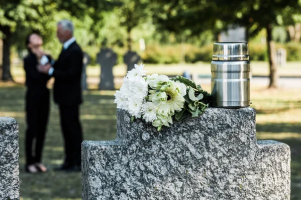
Losing a loved one in an unexpected and tragic event is one of the most heart-wrenching experiences anyone can endure. The emotional trauma is often compounded by the financial burdens that follow, especially when the deceased was a primary breadwinner. Wrongful death settlements seek to provide survivors with financial support and some measure of justice. The process of dividing these settlements, however, can be fraught with complexities and emotionally charged decisions. Understanding the various factors involved and the legal procedures that guide the distribution can be critical to ensure a fair and unprejudiced settlement division.
At Parker + McConkie, we have significant experience with wrongful death lawsuits on behalf of the surviving spouse or surviving children. We recognize that wrongful death cases can be stressful for surviving family members. Still, we can shoulder the burdens of your wrongful death case, allowing you to focus on honoring the memory of your loved one.
Learn more about our services below, and contact us today to schedule a free consultation.

Wrongful death settlements are primarily designed to offer financial relief to those financially dependent on the deceased. Typically, this includes immediate family members like spouses and children. For instance, if the person who passed away was a primary or significant wage earner, their loss can gravely impact the family’s financial stability. The law seeks to compensate those who are left in a precarious financial position due to wrongful death.
In certain circumstances, other relatives, such as parents, siblings, or even grandparents who can prove financial dependency, may also be eligible to receive a portion of the settlement. However, the eligibility criteria vary widely by state, and specific familial relationships may be given priority over others. Therefore, it is always advisable to consult with a legal professional well-versed in the wrongful death laws of your particular jurisdiction to understand who may be eligible to receive a portion of a wrongful death settlement.

Considering Various Factors in Determining the Settlement
The deceased’s age, health, and earning capacity are often critical considerations in the settlement calculation. Younger, healthier individuals with a strong earning capacity often result in higher settlements due to the significant financial loss their untimely death represents.
Other factors, such as the number of dependents, their ages, life expectancies, and their financial circumstances, are also pivotal in determining the settlement.
Assessing Economic and Non-Economic Damages
Settlement amounts also heavily depend on the types of damages being claimed. Economic damages are the quantifiable financial losses arising from the death. This includes the deceased’s lost income (both present and future), medical expenses tied to the final illness or injury, funeral and burial costs, and the loss of any benefits, like pension or health insurance.
Non-economic damages, while more difficult to quantify, are just as crucial. These are the intangible impacts of the death on the survivors, including the loss of companionship, guidance, and consortium and the emotional suffering endured by the survivors.
Identifying the Different Categories of Damages
Once the total settlement amount has been determined, it is divided into different categories of damages. Each category is usually assigned a certain percentage of the total.
Determining the Distribution Percentages
The allocation of the settlement among eligible parties often hinges on their level of financial dependency on the deceased. For example, a spouse who was entirely reliant on the deceased’s income would typically receive a more significant portion compared to a partially dependent sibling.
In many cases, the allocation must also consider the needs of minor children and their long-term financial requirements. In instances where the deceased has children from multiple relationships, the division can become even more complex, requiring careful legal guidance to ensure fair and equitable distribution.
Addressing Outstanding Debts or Liabilities
Before the distribution of the settlement, any debts or liabilities of the deceased are usually paid off. These debts can include outstanding medical bills, credit card balances, mortgages, or personal loans. Funeral and burial costs are also typically covered by the settlement.
In certain circumstances, the estate of the deceased might be required to go through probate, a legal process during which outstanding debts are settled before any distributions are made to heirs or beneficiaries. If a wrongful death claim is part of the deceased’s estate, it may also be subject to the probate process.
Considering the Deceased’s Wishes or Obligations
In cases where the deceased had a will, trust, or other estate planning tools in place, these legal documents might influence the distribution of the settlement. If the deceased expressed specific wishes about how their assets should be divided upon their death, these should be taken into account when dividing the wrongful death settlement, provided they don’t contradict legal statutes.
However, interpreting these legal documents can be challenging, so it’s advisable to consult with an attorney experienced in both wrongful death claims and estate planning to ensure the deceased’s wishes are honored in compliance with the law.
Outlining the Payment Process
Once the settlement amounts and the distribution percentages have been decided, the compensation is generally distributed either as a lump-sum payment or through a structured settlement. The manner of distribution often depends on the specifics of the settlement agreement and the preferences or needs of the beneficiaries.
Exploring Options for Lump-Sum or Structured Settlements
A lump-sum payment provides immediate access to funds, which can be particularly beneficial for large, immediate expenses or investing to generate ongoing income. However, receiving the full settlement amount at once can also pose financial management challenges, especially for beneficiaries unaccustomed to managing large sums of money.
On the other hand, a structured settlement provides payments over time, creating a stream of income for the beneficiaries. This can be a stable source of support, especially for beneficiaries who rely on the deceased for their daily living expenses. However, it might not provide the immediate financial relief that a lump-sum payment can offer.
Strategies for Resolving Conflicts Among Beneficiaries
With the emotional strain surrounding wrongful death claims and the potentially substantial amounts of money involved, disputes can arise among beneficiaries. These conflicts can be about the interpretation of the deceased’s wishes, the calculation of the settlement, or the distribution of the money.
One strategy to avoid or resolve these conflicts is open communication. Encouraging beneficiaries to express their concerns, and fostering a discussion around those concerns, can often lead to a consensus. Legal counsel can facilitate these conversations and ensure all parties’ rights and interests are considered.
Mediation or Legal Remedies if Disputes Arise
If disputes cannot be resolved through communication and negotiation, engaging in mediation or arbitration might be necessary. These alternative dispute resolution processes involve a neutral third party who helps facilitate a resolution.
If all else fails, legal remedies might be the last resort. Beneficiaries can take the dispute to court, where a judge will make the final decision. However, litigation can be costly, time-consuming, and emotionally draining. It’s advisable to exhaust all other options before choosing this path.
Understanding the Tax Consequences of a Wrongful Death Settlement
In general, compensation received from a wrongful death settlement is not considered taxable income by the IRS. This applies to both the federal and most state tax agencies. However, exceptions do exist. For instance, if the settlement includes compensation for lost wages, this portion might be subject to income tax.
Punitive damages, if awarded, are typically taxable. It’s crucial to structure the settlement agreement correctly to minimize tax liabilities. Given the complex nature of tax laws and the potentially high stakes, it’s advisable to discuss with a tax professional who can provide guidance tailored to the specifics of the settlement and the beneficiaries’ financial circumstances.
Seeking Guidance From a Tax Professional if Needed
A tax professional can offer valuable guidance about the potential tax consequences of a wrongful death settlement. They can help decipher complicated tax laws, advise on the best practices for reporting the settlement on tax returns, and provide strategies for tax planning. This advice can help beneficiaries avoid unexpected tax liabilities and potentially save a significant amount of money.
Ensuring Proper Documentation of the Settlement Agreement
Maintaining accurate and comprehensive records is crucial in the division of a wrongful death settlement. The settlement agreement, which outlines the terms and conditions of the settlement, including the compensation amounts and the distribution plan, should be kept safe and accessible.
In addition to the settlement agreement, beneficiaries should keep records of any correspondence related to the claim and the settlement. Receipts of payments, documents showing the calculation of the settlement, and any other relevant paperwork should also be stored securely.
Complying With Any Legal Requirements or Court Approval
In certain circumstances, the court might need to approve the settlement agreement. This is especially common in cases involving minors or legally incapacitated adults. The court serves to protect the interests of these parties and ensure the settlement is in their best interest.

Negligence pertains to a failure to exercise reasonable care, resulting in the death of another person. Examples include car collisions caused by drunk driving or accidents caused by unsafe working conditions.
This refers to a healthcare provider’s negligence, such as surgical errors, misdiagnosis, or failure to diagnose a fatal disease.
Intentional acts involve deliberate harm, such as assault or murder.
Commonly, a wrongful death lawsuit must be filed within a specified period, known as the statute of limitations. This varies by state and can be as short as one year from the date of death. In Utah, the statute of limitations is two years. It’s essential to consult with a legal professional promptly to avoid missing this deadline.
Damages in a wrongful death claim aim to compensate for the financial and emotional loss suffered by the survivors. These can include lost earnings, loss of companionship, pain and suffering, and funeral expenses. In certain cases, punitive damages may also be granted.

The process of dividing a wrongful death settlement is complicated and can be overwhelming for those grieving the loss of a loved one. At Parker + McConkie, our compassionate and experienced legal team can guide you through this complicated process, ensuring that your rights are protected.
Call us today to schedule an initial consultation.



